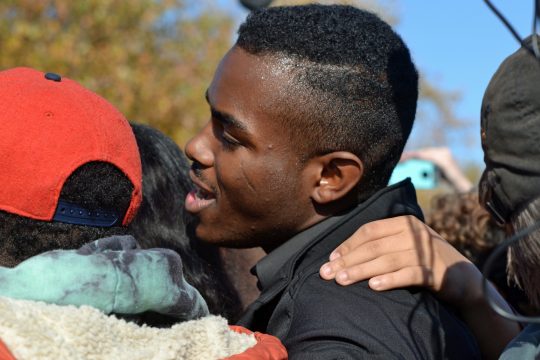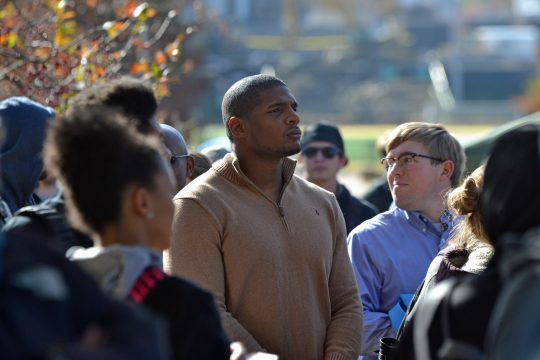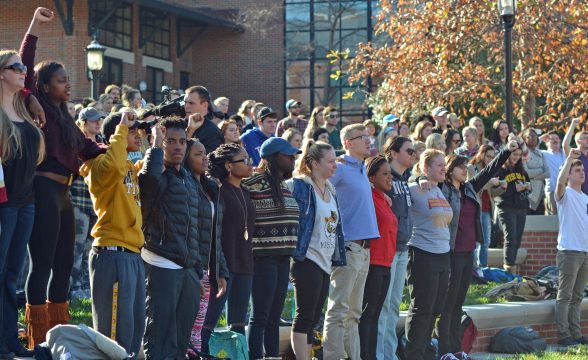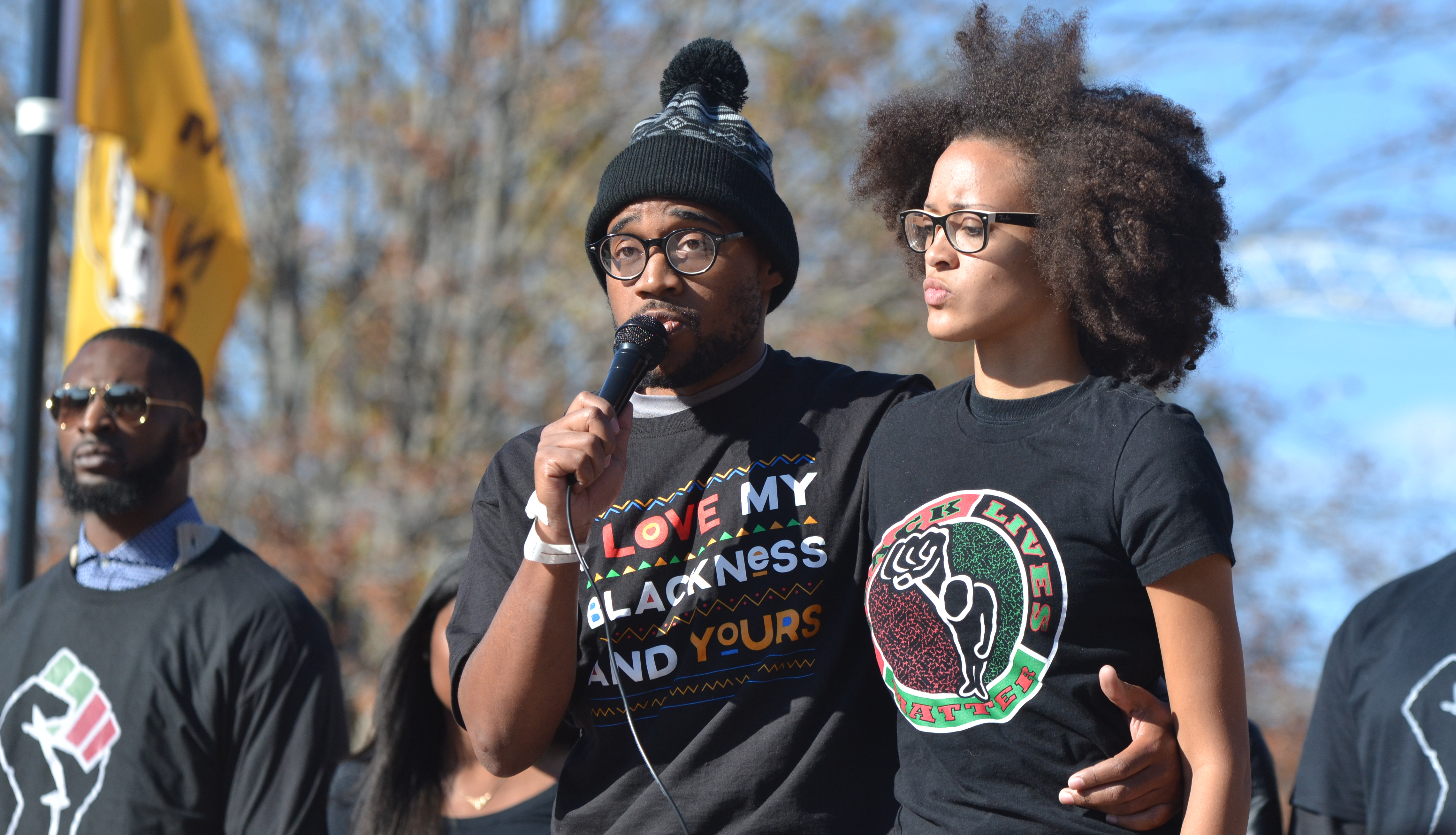(Pictured above: Jonathan Butler, the student who committed to a hunger strike until President Tim Wolfe’s resignation, with a Shelbey Parnell of Concerned Student 1950.)
COLUMBIA, Mo. – For the first time in a long time, the student dissent, racial turmoil and activism swirling over the University of Missouri campus like a hurricane appeared to break into sunlight.
An eruption of cheers from students, faculty, and supporters of the Concerned Student 1950 movement that filled Carnahan Quad Monday morning signaled they had received word that MU system president Tim Wolfe had resigned due to pressure from students, faculty members, and legislators, among others.
The black students at the forefront of Concerned Student 1950 led a crowd of thousands in prayers, chants and hymnals. Cries of “Ase,” a Yoruba word that refers to the power of change, with the response “Power” filled the quad along with their slogan;
It is our duty to fight for our freedom. It is our duty to win. We must love and support each other. We have nothing to lose, but our chains.
After they dispersed, students and faculty members of all races supportive of their calls for reform across the system, formed a circle to give respite and time for celebration for core members, who mingled and cheered around the tents and makeshift campground they have called home for the past week. (By design, the ring prevented an onslaught of reporters from around the state and the nation from rushing in for photos and interviews. The contention between the press and Concerned Student 1950 has become pronounced in recent days. It resulted in multiple sources not wishing to speak or only in anonymity).
“It’s simply amazing,” Jaylah Brooks, a junior business accounting student, said. “Never in a million years would I have thought I would have seen something like this. Just all the unity, from the teachers, the football players, everyone. It says a lot. We finally see how much power we really do have.”

That power managed to oust the UM system president and people around campus and the country have taken notice. The cries for reform came after a week which saw an explosion of activism on campus which brought a small student organization to national attention. After a white person called Missouri Student Association president Payton Head a racial slur and after other racist acts on campus, as well as Wolfe’s callousness and inaction at a protest during Homecoming in early October by Concerned Student 1950, his inability to decisively act made him a target for student organizers.
Last Monday, Jonathan Butler, a member of Concerned Student 1950, began a hunger strike, stating he would not eat until Wolfe left office. The Mizzou football team drew attention Saturday night by announcing they would boycott the rest of the season until Butler’s demand was met.
Butler, obviously, got what he wanted, but only after seven days of not eating. However, some students doubted Wolfe stepped down for the sake of one student’s life.
“None of this would have happened if it wasn’t for our football team,” said a woman who asked to remain anonymous. “They were going to let that boy die. The president did not care about him at all. I honestly think that he stepped down because Mizzou was taking such a big loss on money.”
Now, the general sense among supporters is that with new leadership, change will be possible.

“We know we have the power to do certain things,” one student who asked not to be named said. “We have the power to get [the president] fired. He stepped down today. He needed to go… especially since the things he said, his negligence toward the black student body.”
Attending members of the faculty and staff expressed their support for the students, adding that the level of civility in their civil disobedience was encouraging.
“It’s just wonderful to see them take charge and demand change and demand to be seen and heard and not be marginalized,” psychology professor Jeff Rouder said. “I think it does our university good that our students are critical of things.”
“I am impressed with the students’ work, with the organization, their focus,” said librarian Rebecca Graves. “The ones that have suffered the most have behaved the best of the students. The students that have behaved the worst on Twitter and YikYak, they need to go back to kindergarten and learn some basic rules of civil behavior.”
Critique of the protests have ranged from dismissive to interrogatory to hateful, however the general sentiment amongst supporters hope that this moment is a flashpoint for other problems affecting the campus that have drawn sharp lines between the university’s administration and everyone else.
“Hopefully, this is the first step toward recognition of additional problems,” said Barbara Jones, a member of the staff. “Yes, the African-American population has problems with discrimination. But what about the Hispanic population what about the Muslim population, what about women and gender equality. Hopefully, this is the beginning of an equalization process for everybody.”
“It’s a significant step forward in demanding the respect they deserve and the empathy they deserve,” Rouder noted. “Any student of color knows what they face in a way that white people can’t understand.”
While the racist acts inflicted upon black students certainly added fuel to a growing desire for change at whatever cost, smaller, lingering racism has plagued the campus for a longtime.
Two black students spoke about their experiences. One said even walking on the sidewalk earned sour responses from some white students.
“If… we pass a group of white people they’ll step to the side or look at us funny, and I’ve experienced it in my dorms,” she said.
“I remember one time… I ordered my food first and a white guy ordered his food after mine,” the other added. “He got his food first, and we ordered the same thing. It’s the small stuff, it’s not just always overt racism right in your face.”
A renewed prevalence of the Confederate flag has also concerned the two students.

After the rally, the 11 student-founders of Concerned Student 1950, the number coming from the year Mizzou admitted its first black student, spoke to a large gathering of students and media at Traditions Plaza near Carnahan. Butler arrived with an IV wrapping on his hand, moving feebly, one of his compatriots helping him stand and walk. He received cheers from the hundreds gathered around the platform.
“I want to acknowledge this was not me alone,” Butler said. “It was these people I am standing on stage with. It was the black community, it was the black faculty, it was the other faculty, it was the Forum on Graduate Rights, it was the people at Planned Parenthood, it was everybody who chose to stand up in this time who made this possible. This was not Jonathan Butler, this was the Mizzou community for one of the first times that I’ve ever seen stand together united.”
Then, the black students laid out their next move.
“The resignation of Tim Wolfe is a glimmer of hope for historically marginalized students whose voices have been silent by patriarchal, white male institutions,” Marshall Allen, a prominent member of the movement, said. “Moving forward, Concerned Student 1950 demands an immediate meeting with the UM system Faculty Counsel, Board of Curators and the governor of the state of Missouri to discuss shared governance and create a system of holistic inclusion for all constituents.”
Their call for shared governance resounded among those gathered. One black student, who asked to remain anonymous, added it was of utmost important for all students, but especially minority students “to have involvement in who’s going to be in authority and who’s going to have power over us instead of just the older, white men who only care about the money. It’s more than the money, it’s about the school itself.”
With greater student involvement in the governing process, Concerned Student 1950 hopes that the administration becomes both more responsive and accountable to students.
The organizers added that for other movements on campuses across the nation, that for students lacking privileges, the example set by the students at Mizzou is a powerful one.
“We learned that if you’re marginalized, keep fighting,” Rueben Faloughi said. “Keep fighting because you can get what you want, you can get what you deserve.”
“You don’t have to settle for anything less than what you deserve because we deserve to come to institutions where our minds will evolve,” DeShaunya Ware added. “We criticize Mizzou because we love Mizzou.”
Now, Concerned Student 1950, as well as the students faculty and staff supporting their struggle, hold onto a sense of determined optimism. With the ability to take a sitting university president out of office due to his inaction, the group will confidently move forward for their next set of demands – demands they hope address their concerns with the all-to-prevalent racism that strangles the experience of students of color on campus. They do so with the nation watching as a fraternity at Yale bars black women from their house parties, as students at Ithaca College call for their own president’s dismissal due to racist remarks made by public safety officers, as Duke University still reacts to a noose found hanging on campus, as racist comments have become a mainstream reality at American University and as hundreds of thousands of students of color around the nation feel marginalized by the institutions designed to help all young people grow into productive and valued members of society.
Although black students have achieved the first of their goals at the University of Missouri, the eyes of the world will remain on Columbia to see if the hurricane breaks or if the school and the students fighting for change are merely passing through its eye.




